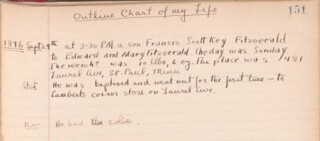Save $5.00 [crossed out] $3.00 per week
Thomas Jones
Towards the end of The Great Gatsby, Gatsby’s father shows Nick Carraway a book Jimmy Gatz had ‘when he was a boy’, a copy of Hopalong Cassidy with a handwritten ‘schedule’ on the last fly-leaf, mapping out his day: ‘rise from bed’ at 6 a.m., followed by ‘Dumbbell exercise and wall-scaling’, ‘Study electricity, etc’, ‘Work’, ‘Baseball and sports’, ‘Practise elocution, poise and how to attain it’ and ‘Study needed inventions’. There’s also a list of ‘general resolves’:
No wasting time at Shafters or [a name, indecipherable]
No more smoking or chewing
Bath every other day
Read one improving book or magazine per week
Save $5.00 [crossed out] $3.00 per week
Be better to parents
Henry C. Gatz ‘was reluctant to close the book’, Nick says, ‘reading each item aloud and then looking eagerly at me. I think he rather expected me to copy down the list for my own use.’ It’s a mean thought, and a funny one. But Fitzgerald may have been mocking himself as much as Gatsby’s father. The University of South Carolina has made freely available online a fully searchable digital facsimile of a ledger that Fitzgerald kept between 1919 and 1938. In it he kept a ‘Record of Published Fiction’, details of ‘Money Earned by Writing since Leaving Army’, ‘Published Miscelani (including movies) for which I was Paid’, ‘Zelda’s Earnings’ and an ‘Outline Chart of my Life’, one page per year.
He wrote most of The Great Gatsby when he was 27, ‘the most miserable year since I was nineteen, full of terrible failures and accute miseries. Full of hard work fairly well rewarded in the latter half and attempts to do better’. September 1923: ‘High Hopes for the play. A new schedule & more work on the novel. Ball game (worlds series).’ April 1924: ‘Out of the woods at last & starting novel. Gloria Swanson’s party. Kauffman’s party. Decision on 15th to go to Europe.’ Twenty-eight years old was ‘The year of Zelda’s sickness and resulting depression. Drink, loafing & the Murphys.’ Among the lists of names of friends, places, drinks and fights with Zelda, he records for September 1924: ‘Hard work sets in.’ October: ‘Working at high pressure to finish.’ November: ‘Novel off at last.’
The entries for his childhood are more entertaining. For September 1900, the month he turned four, he wrote: ‘He had a party to celebrate his birthday. He wore a sailor suit about this time & told enormous lies to older people about being really the owner of a real yatch.’
As for the financial accounts, Elizabeth Sudduth, the director of the Irvin Department of Rare Books and Special Collections at USC, told the Associated Press that the ledger showed Fitzgerald ‘was far more on top of his affairs than people thought’. That’s one way of looking at it. But knowing where the money came from isn’t the same as knowing where it went. In 1934 he earned $20,032.33 from his writing. ‘Debt bad,’ the entry for November 1934 says on the ledger’s last page. ‘Borrowing more from mother.’ February 1935: ‘Debts terrible.’ And making schedules isn’t the same as keeping to them. February 1935 continues: ‘Went on wagon for all liquor & alcohol on Thursday 7th (or Wed. 6th at 8.30 P.M.)’

Comments